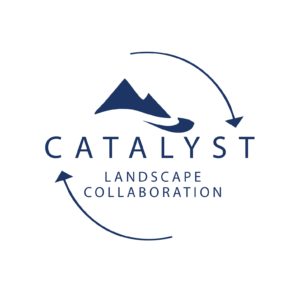Landscape Collaboration Catalysts

What is a Landscape Collaboration Catalyst?
Landscape Collaboration Catalysts are focused on the complex, challenging work of building, coordinating, and sustaining collaboration to secure better futures for the landscapes and communities in which they work and that they cherish. Through the Catalyst Fund’s peer learning program, these practitioners are members of a robust community of practice (and joy!), and have explored, developed, and honed the approaches, mindsets, and skills that are required to be effective leaders in the collaborative spaces in which they operate.
Landscape Collaboration Catalysts embrace a belief in the power of people coming together—across difference—to do more together than any of us can do alone. Supporting and coordinating Landscape Partnerships, where a breadth of partners have come together to collectively conserve, steward, restore, and/or manage the lands and waters of a landscape, Catalysts are highly sophisticated and strategic collaborative leaders. Catalysts orient holistically to the complexity of our world and the web of interconnections—across human and natural systems—that define the reality of place. Indeed, in their work Landscape Collaboration Catalysts are pushing to advance deep, transformative approaches to collaboration that aim for an ethical, inclusive and just future in which our landscapes and our communities are thriving.
Through their experiences coordinating Landscape Partnerships and having benefited from engagement in the Catalyst Fund peer learning program, Landscape Conservation Catalysts carry knowledge, insight, and expertise in core competencies for building and sustaining collaboration for landscape impact. These competencies include:
- Collaborative leadership—the individual, interpersonal behaviors and characteristics that allow practitioners to participate in, guide, and shepherd effective and impactful collaborative processes;
- Network mindset—an understanding of:
- how the mental models we carry about how the world works undergird our orientation to our work and our ability to imagine pathways for responses to challenges or problems we are facing;
- distinctions between a conventional ‘organization mindset’ and a ‘network mindset’;
- how network mindset can be especially valuable for addressing complex, systems-level challenges.
- Cross-cultural collaboration—An understanding of how to orient from a learning and growth mindset, and an understanding of the nuances, challenges, and opportunities of building connection and collaboration across cultures.
- Collaborative Process Management—an understanding of how groups of partners function over time in the pursuit of a shared goal, including an understanding of:
- The dynamic tensions continually at play within collaborative groups;
- Collaborative governance and structure;
- The creation and maintenance of group culture.
- Meeting Facilitation—an understanding of frameworks, tools, and approaches for structuring, facilitating, and supporting group conversations and meetings in a heart-centered fashion.
